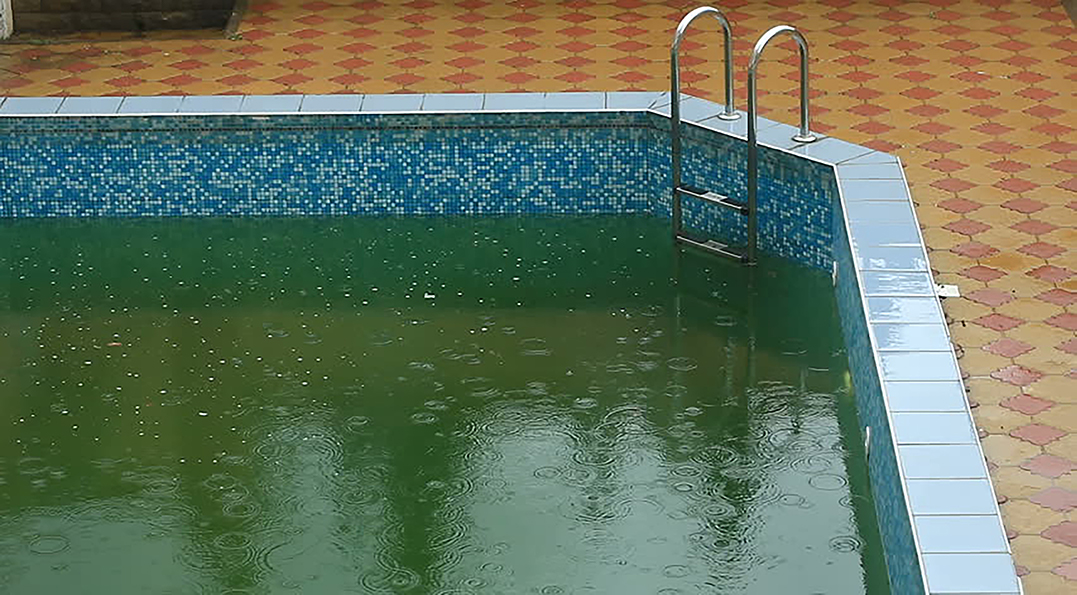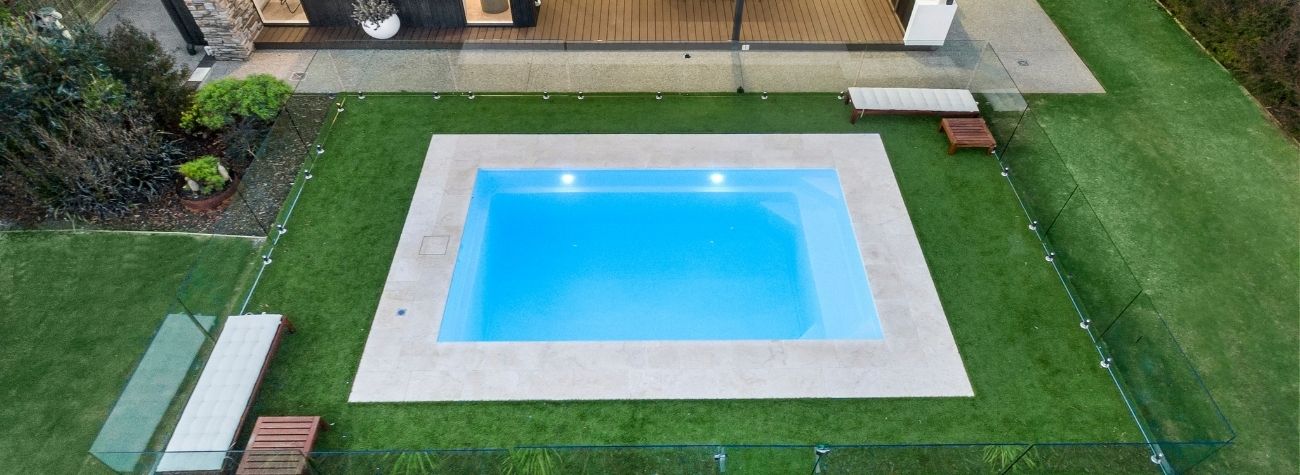Cleaning your swimming pool doesn’t have to be a laborious task. One of the many benefits of owning a fibreglass pool is that they are simple to maintain and require little commitment to keep them healthy and safe to swim in. Throughout this article we will share some easy tips to help you clean your fibreglass swimming pool.

Remove debris from your pool water often
Pools are known to collect leaves, debris, and dead insects. It is a good idea to remove them before they sink to the bottom of the pool as this is when they will start breaking down and disrupting your pool waters chemistry levels. If you have dense foliage around your pool area your water will have higher amounts of organic litter in it and you will need to ensure it is removed frequently. A dirty pool is unsanitary to swim in and looks unpleasant too, to avoid this, have a cleaning timetable and allocate time each week to see to your pool’s maintenance. If you can, trim back trees and shrubs surrounding your pool area on a regular basis to minimise them shedding into your pool.
The good news is pool cleaning equipment doesn’t have to be expensive. Simple pool scoops are cheap to buy and an effective way of getting rid of the dirt and leaves floating on the surface of your pool. In conjunction with your pool scoop you should clear your skimmer basket of debris weekly at the minimum. You’d be surprised at how quickly these fill up.
Stick with products that are specifically designed for your pool
Cleaning chemicals typically have strong active ingredients and if you use one that is not specifically designed for your pool you can damage the interior surface and the equipment. Additionally, using the incorrect cleaner for your pool can throw your water chemistry levels off which will result in more money and time spent trying to rectify the issue. It may be tempting to use an inferior product that has the “same effect” however, a pool is a big investment and you want to extend its lifespan not reduce it.
Watch out for stains
Stains can make you pool look dirty when it is not, which isn’t ideal. They are usually caused by an imbalance in your pool chemistry levels, the most common culprit being heavy metals. You should know what is causing the stain before attempting to treat it. The colour of the stain can give you an idea of what is causing it. For example, grey tinged stains are typically caused by high levels of magnesium. Iron results in maroon coloured stains and blueish-green stains are found when there are high concentrations of copper in the water. Your pool can also get stains from organic matter such as dirt, leaves and algae which are green or brown coloured.
To stop stains from ruining the appearance of your pool, ensure that you regularly clear your pool of debris and use a metal chelating agent as a part of your cleaning schedule once a month. Our team can offer helpful advice in relation to this topic.

Clean out the filter
Without a filter pump in your pool, the water would turn green quite quickly. It works by circulating the water in your pool and collects the dirt and debris to maintain the water quality. There are a few different filter options on the market including cartridge and sand filters as well as saltwater chlorinators. Your filter pump will need to run for a minimum of 8 to 10 hours per day and you should clean the filter cartridges out weekly to ensure they are working to their full potential. You can do this by backwashing the filter to get rid of any dirt, then switch it off and open the relief valve gradually. Lift the top of the filter to remove the filters carefully. Rinse clean with a garden hose, replace into the cartridge and close the clamps. Turn it back on and ensure the air valve is open to release any excess air. If you are not confident doing this, our team are experts when it comes to pools and can offer helpful advice to guide you through this process correctly. So you may be wondering “Do I Need To Run My Pool Pump Everyday?“
Check water chemistry levels often
An important part of pool care is maintaining the correct chemistry levels. The simplest way you can monitor the quality of your pool water is buy purchasing a water testing kit. They are easy to use and relatively inexpensive. The kit comes with testing strips that you dip into a sample of your pool water. They give you an on the spot indication of whether your water is balanced or not. You can compare the colours of your testing strip against the graph provided in your kit to see if any of your pools levels are off or not. It is a good idea to have the necessary pool chemicals on hand, so if any of your levels are out you can alter them accordingly. When there are big bouts of rain, your water will more than likely need adjusting.

Pool cover
An effective way to reduce the amount of debris and dirt that gets into your pool water is by purchasing a pool cover. Pool covers reduce heat, chemical and water loss by up to 70% and are a must have pool accessory if you want to not only save time but money also.
Smart cleaning system
Smart technology is the way of the future and pools are no exception. To reduce your maintenance to the bare minimum, you can install a smart cleaning system in your pool. They allow you to take care of all your pool care needs right from the convenience of your smart phone.
Automatic pool cleaner
An automatic pool cleaner that reaches every nook and cranny of your pool will save you having to do it manually. They are a worthwhile investment if you want to reduce the amount of time you spend cleaning your pool but don’t necessarily have the budget for a smart system.

A small amount of effort can go a long way
Fibreglass pools are easy and simple to look after and with a little bit of effort, you can keep them functioning to their full potential. By dedicating time each week to clear your pool of debris and by keeping an eye on your chemical levels, your pool water should be crystal clear year-round ready for you to use when you please. Not only that, you can potentially reduce your running costs too. The cleaner your pool is, the better the equipment will work and the less chemicals and energy it will use. If all else fails and you decide pool cleaning is not for you, we recommend outsourcing a pool cleaner to regularly look after and service your pool for you. This will ensure your pool is working at its best and saves you the hassle of having to do it. If you require additional information or have any questions about keeping your fibreglass pool clean, give our experienced team here at The Fibreglass Pool Company a call, we are happy to help if we can.
